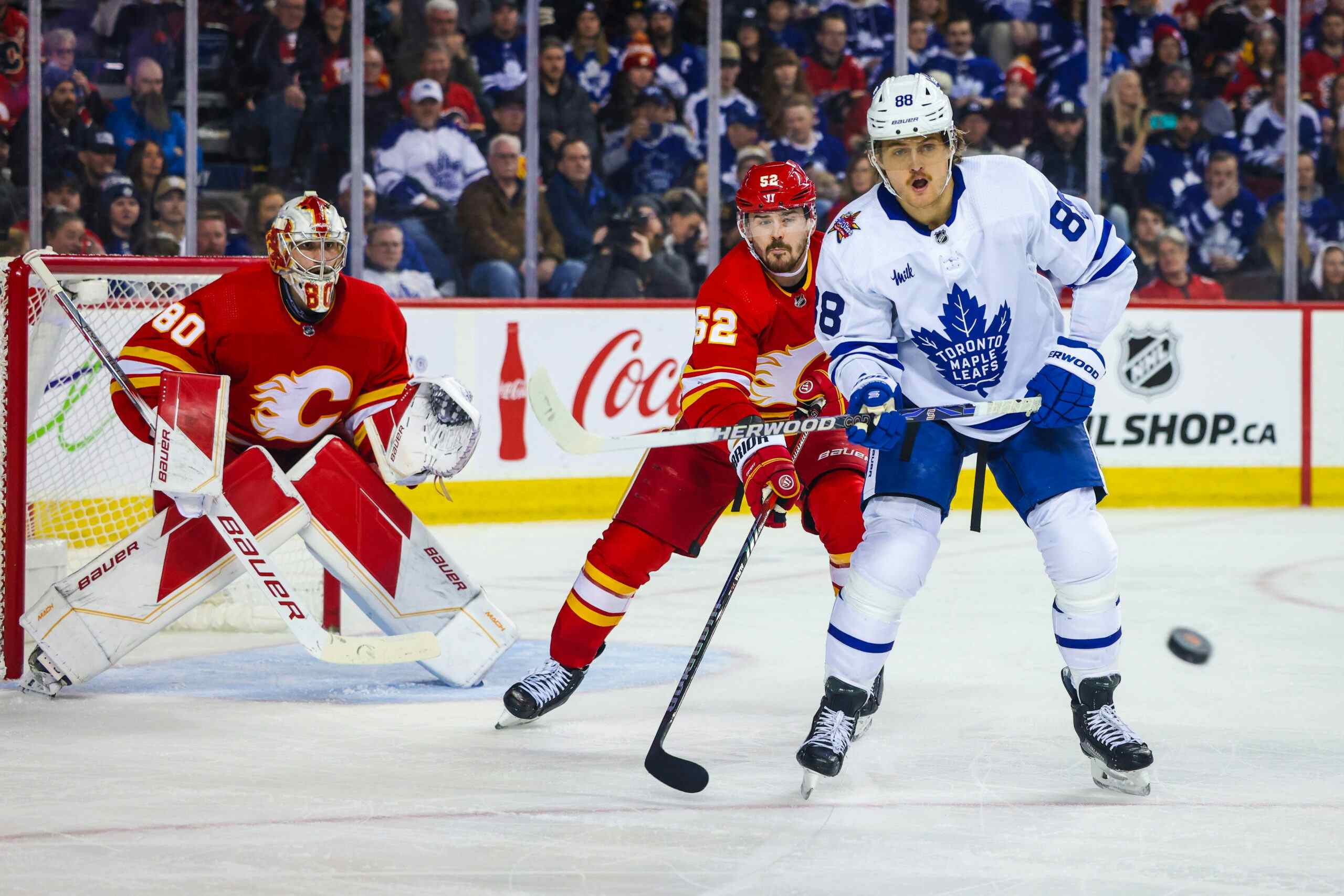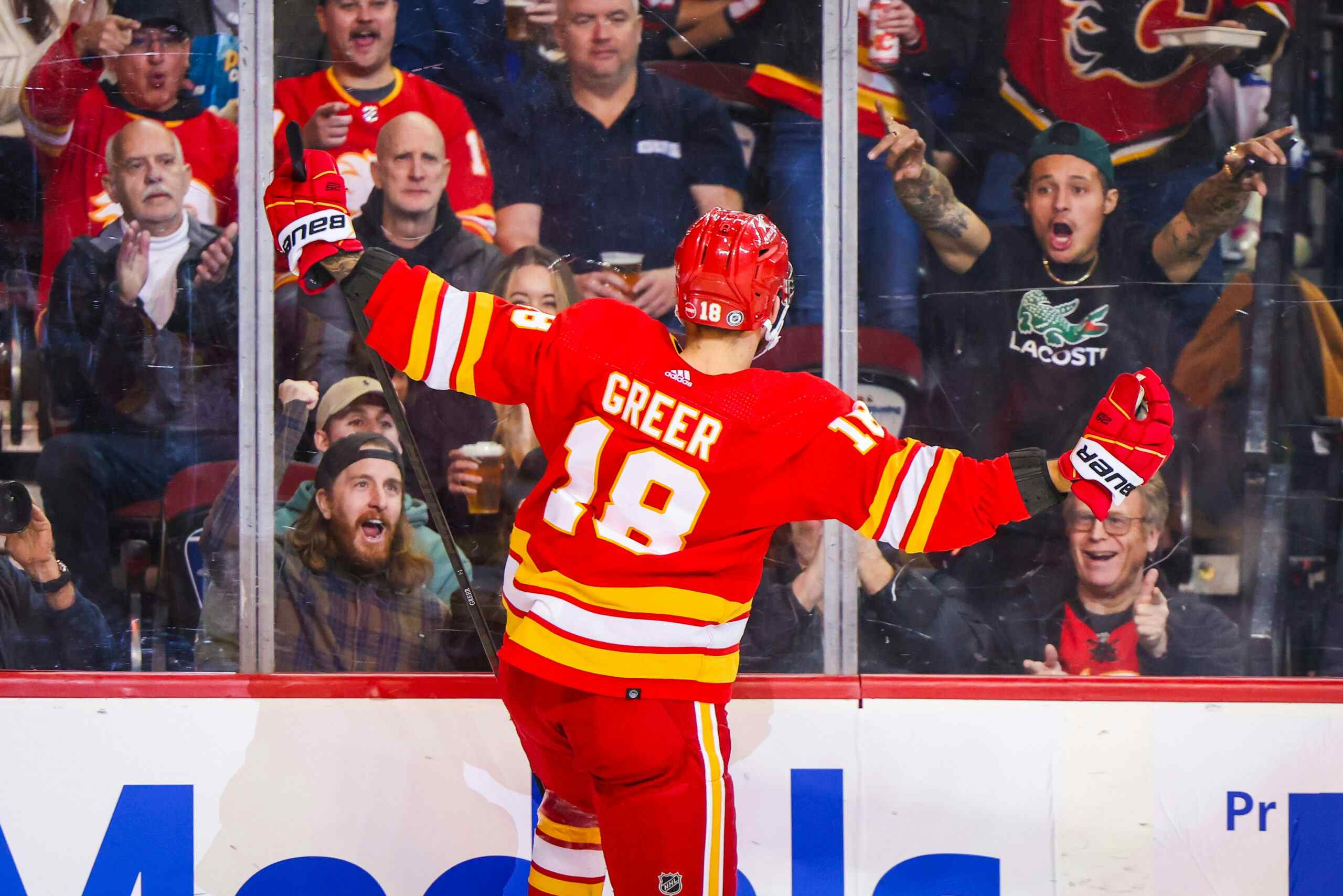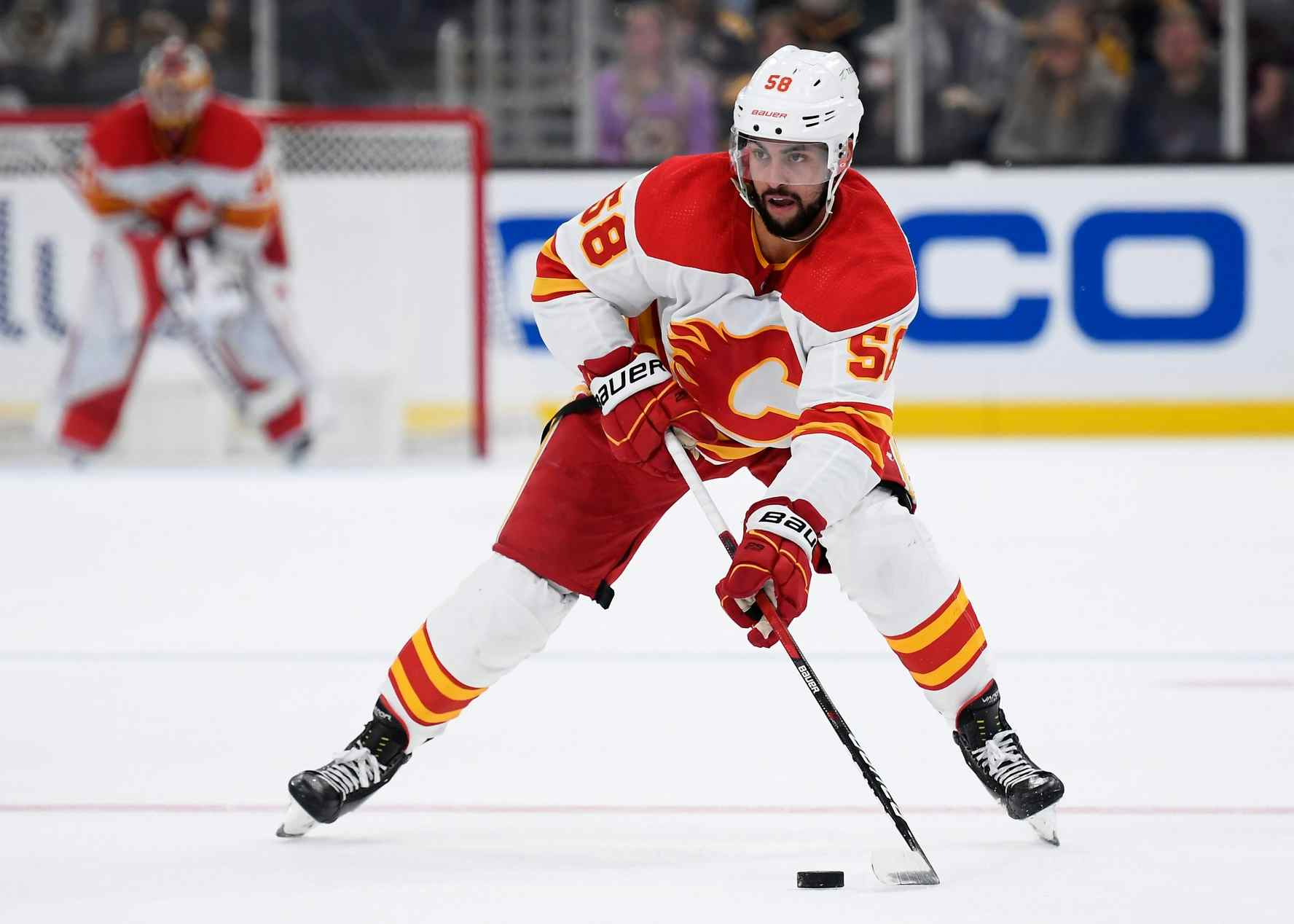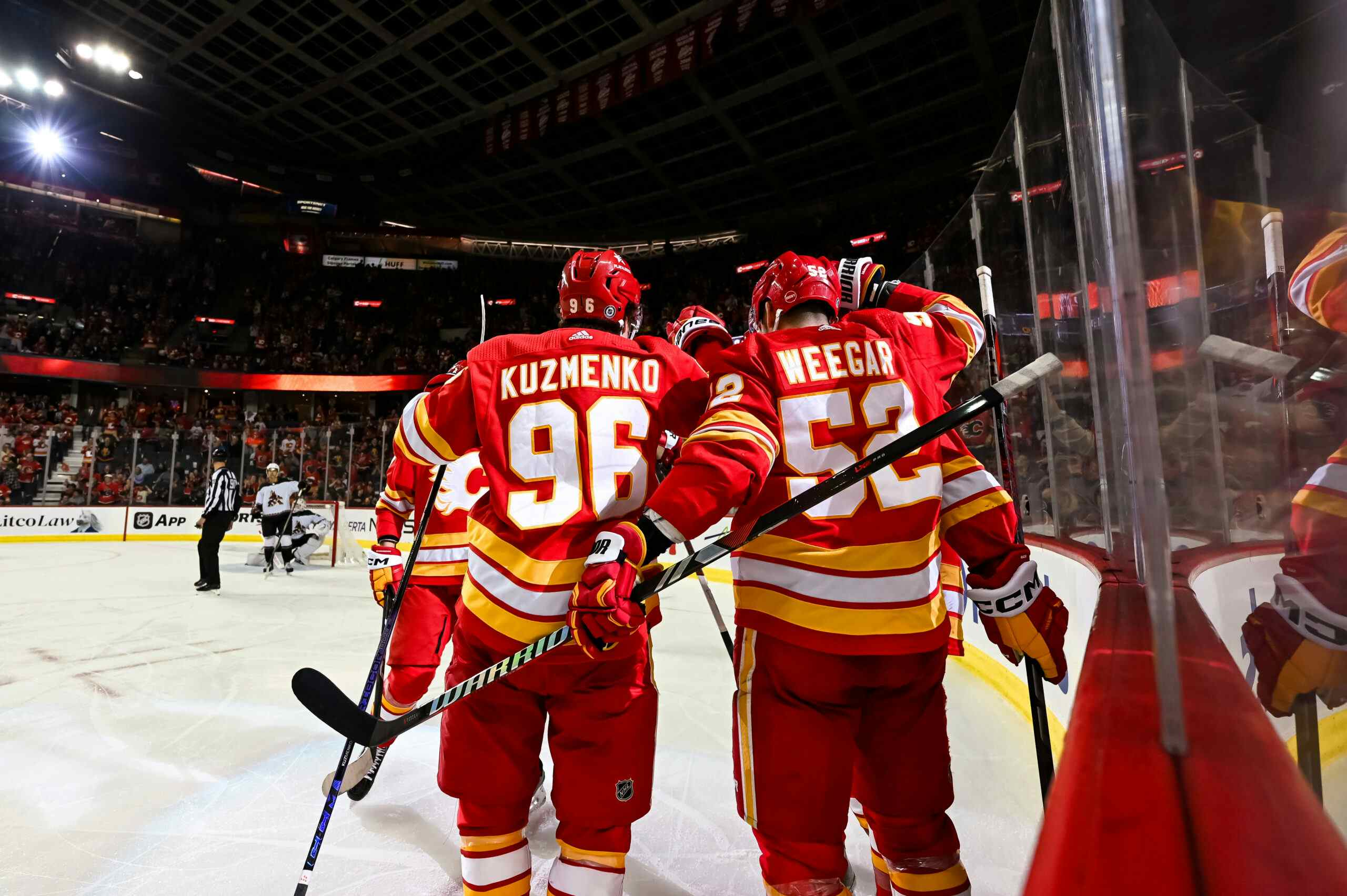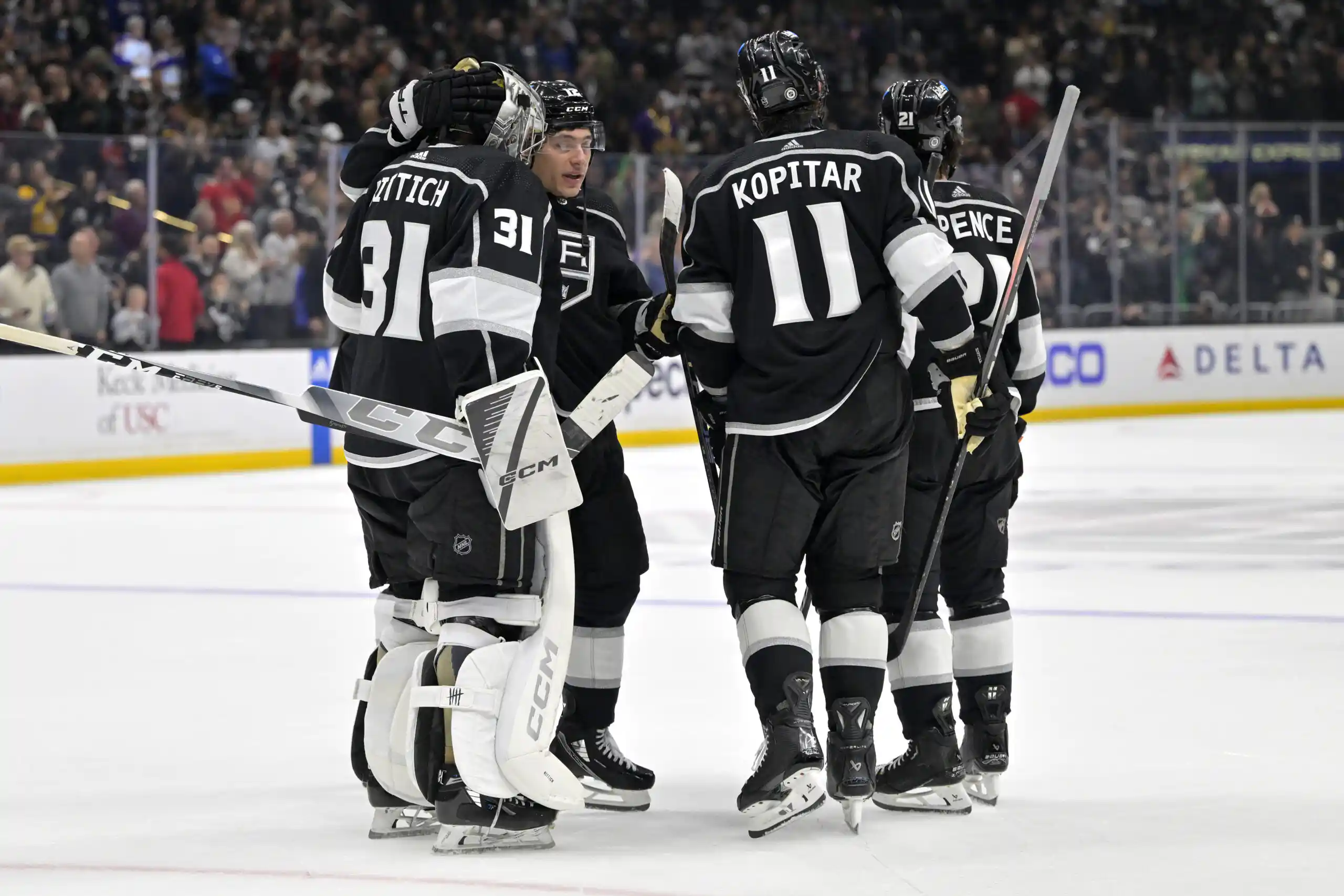Flames in seven games: 3-4-0 in season’s 10th segment
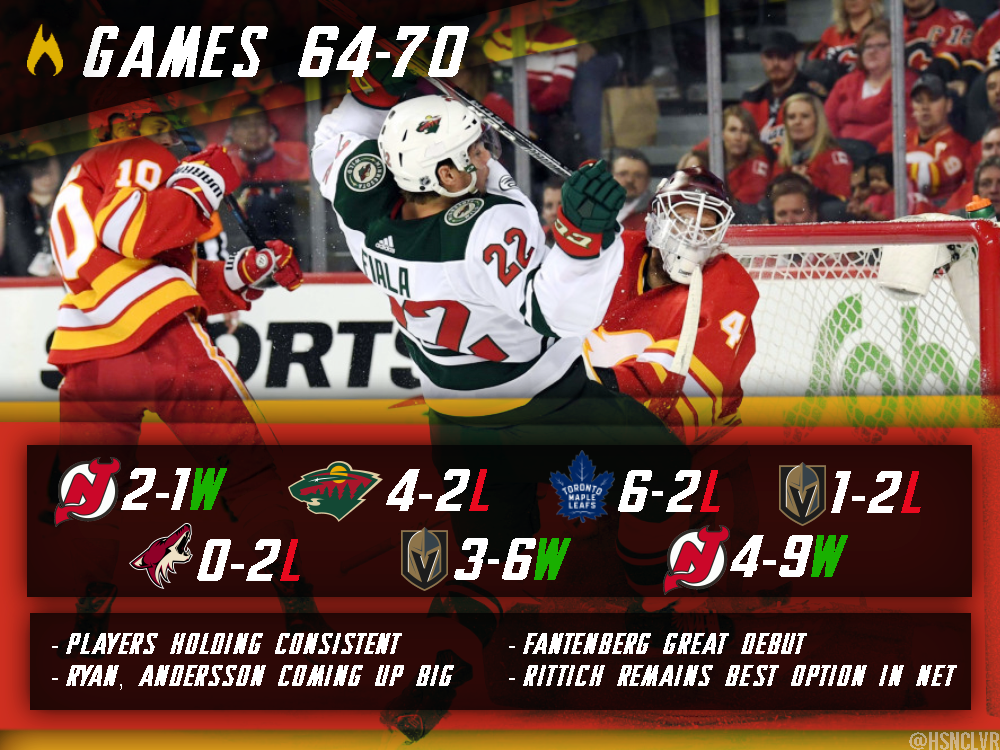
By Ari Yanover
5 years agoIt took 10 segments, but finally, the Flames have had their worst stretch of the season. It could end up costing them the division – but that it took until March to falter to that extent is pretty impressive for a team that wasn’t supposed to perform this well this soon.
In their first seven-game segment, they were 4-3-0. In their second, they improved to 4-2-1. In their third, they were once again 4-3-0. In their fourth, they improved to 5-1-1. In their fifth, they kept it up with a 5-2-0. In the sixth, they fell to 3-2-2. In the seventh, they shot up to 6-0-1. In the eighth, they plummeted to 3-3-1. In their ninth, they recovered back to 6-0-1. You gotta hope they can experience a similar recovery for the next one, because this is the first time all year they’ve had a seven-game segment under the .500 mark.
Underlying numbers via Natural Stat Trick.
Team stats
Now at 43-20-7, the Flames are in the midst of a tight battle for the division. They have a .664 points percentage through the season so far, down from their previous .690. It has them tied for third in the NHL, and second in the Western Conference and Pacific Division.
- Their goals for per game is 3.57, down a little from their earlier 3.62. They’re tied for third overall in the NHL, and second among all Western Conference teams and the Pacific Division.
- Their goals against per game is 2.84, up a little from their previous 2.81. They’re 10th in the NHL, sixth among Western Conference teams, and third in the Pacific Divison.
- Their goal differential is unchanged from +47. It has them tied for second in the NHL, and first among Western Conference teams and the Pacific Division.
- Their powerplay is at 21.8%, down a little from their earlier 22.1%. It’s 10th in the NHL. They’re fourth in the Western Conference, and second in the Pacific Division.
- Their penalty kill is at 79.7%, up a little from their earlier 79.1%. It’s 20th in the NHL. They’re ninth in the Western Conference, and fifth in the Pacific Division.
- At 8:47 penalty minutes per game, they’ve taken fewer infractions, down from 8:58 earlier. They’re 19th when it comes to penalties taken in the NHL, 10th in the Western Conference, and fifth in the Pacific Division.
- Their 5v5 CF/60 is 60.47, up from their previous 59.54. It’s the sixth highest in the NHL, and third among Western Conference and Pacific Division teams.
- Their 5v5 CA/60 is 52.97, down from their previous 53.29. It’s the fourth lowest in the NHL, and third lowest among Western Conference and Pacific Division teams.
- Their 5v5 CF is 53.31%, up from their previous 52.77%. It’s the fifth highest in the NHL, and third among Western Conference and Pacific Division teams.
- Their 5v5 shooting percentage is 8.76%, down a little from 8.85%. It’s seventh in the NHL.
- Their 5v5 save percentage is 91.64%, down from 91.99%. It’s 20th in the NHL.
- Their PDO is still 1.004, down a little from their previous 1.008. It’s eighth in the NHL.
So, what’s changed?
Not particularly surprising, as they embarked on a four-game losing streak, but the Flames scored fewer goals and gave up more along the way. Their past couple of games likely helped redeem their offensive numbers – 15 goals in two games will do that – but in their first five games they only scored seven goals total, and were shut out for the fourth time this season.
Still, though, the Flames remain one of the best goal-scoring teams in the NHL, and they’re pretty good at not giving up corsi events, as well – it’s just that they’re in a division with another team slightly more exceptional at these facets than they are in the Sharks, and the Sharks have had a good stretch at the exact same time the Flames had a poor one.
The Flames also experienced a drop in goaltending, as their save percentage declined a little, as did their shooting percentage. That’s reflected in a PDO a little closer to 1.000 – though they aren’t even close to being an outlier. (Toronto, the Islanders, Tampa, and Washington all have PDOs of 1.020 and above, and Pittsburgh is at 1.016; the Flames are fine.)
The important takeaway from this is the Flames still have solid underlying numbers: this was their worst stretch as a team, and they came out of it just fine. They’re still good.
Player stats
First, the forwards (all situations, ordered by ice time).
Game scores courtesy of our very own Ryan Pike: 0.950 and above is considered great; 0.450-0.950 good; 0.150-0.450 fine; -0.150-0.150 bad; under -0.150 awful.
| Player | TOI | Goals | Points | P/60 | SH% | CF% | GF% | OZS% | Game score |
| Lindholm | 1416:00 | 27 | 76 | 3.22 | 15.98 | 55.99 | 62.63 | 53.31 | +1.169 |
| Gaudreau | 1408:46 | 33 | 90 | 3.83 | 14.86 | 60.12 | 64.86 | 68.99 | +1.410 |
| Monahan | 1357:30 | 31 | 76 | 3.36 | 16.15 | 59.82 | 62.57 | 69.72 | +1.190 |
| Tkachuk | 1226:31 | 30 | 68 | 3.33 | 16.95 | 61.87 | 65.99 | 66.53 | +1.114 |
| Backlund | 1173:52 | 19 | 43 | 2.20 | 11.33 | 53.71 | 58.82 | 49.79 | +0.847 |
| Ryan | 921:12 | 9 | 28 | 1.82 | 11.25 | 52.40 | 51.81 | 44.70 | +0.478 |
| Bennett | 915:13 | 12 | 26 | 1.70 | 10.91 | 56.06 | 51.76 | 63.39 | +0.510 |
| Jankowski | 857:10 | 10 | 25 | 1.75 | 11.90 | 46.38 | 43.42 | 41.69 | +0.407 |
| Neal | 826:10 | 5 | 15 | 1.09 | 4.10 | 54.95 | 49.18 | 64.58 | +0.408 |
| Frolik | 691:58 | 13 | 27 | 2.34 | 12.26 | 53.84 | 60.61 | 52.44 | +0.740 |
| Hathaway | 654:30 | 7 | 11 | 1.01 | 10.94 | 43.18 | 47.83 | 46.12 | +0.225 |
| Czarnik | 455:37 | 6 | 12 | 1.58 | 11.32 | 56.03 | 43.90 | 59.12 | +0.401 |
| Mangiapane | 316:58 | 4 | 7 | 1.33 | 9.30 | 55.01 | 55.00 | 59.63 | +0.380 |
| Dube | 227:58 | 1 | 5 | 1.32 | 4.55 | 48.10 | 56.25 | 64.04 | +0.227 |
| Quine | 85:03 | 3 | 4 | 2.82 | 50.00 | 48.91 | 57.14 | 52.00 | +0.327 |
| Lomberg | 27:55 | 0 | 0 | 0 | 0 | 27.27 | n/a | 55.56 | -0.244 |
| Rychel | 18:21 | 0 | 0 | 0 | 0 | 36.36 | 50.00 | 40.00 | -0.268 |
| Peluso | 16:27 | 0 | 0 | 0 | 0 | 48.15 | 0.00 | 25.00 | -0.019 |
Even though the Flames went on their worst stretch of the season, one that saw their scoring largely dry up until the final two games, not a lot really changed for their forwards. Their underlying numbers are all extremely similar to the previous stretch, and this kind of got hinted at in the team stats: their shot attempt numbers improved, but their percentages went down, which is similar to what happened here.
Johnny Gaudreau got a slight boost, likely due to having a six-point night (and being close to breaking out prior to it), while little changed for Sean Monahan, and Elias Lindholm fell off slightly. Matthew Tkachuk may have had the most dramatic improvements, particularly on the actual scoring side of things, while both Mikael Backlund and Michael Frolik stayed consistent in their play.
One thing that’s curious is that, for someone typically slotted in to play on the fourth line, Derek Ryan has gotten a lot of minutes this season. This seven-game segment has been kind to him, too; he’s seen some notable improvements across the board, particularly in both the goals for and game score categories. For as enigmatic as Sam Bennett is, he’s still playing well in his own right; Bennett and Ryan now lead the tier of forwards after the top six (with Frolik pretty much an established member of it by this point), while Mark Jankowski follows up a bit further back.
Andrew Mangiapane continues to improve, looking more and more like a regular NHLer with each game, while Austin Czarnik’s performance, predictably, suffered a drop once the puck stopped going in for him all the time. Garnet Hathaway is making things work on his line with Ryan and Mangiapane.
James Neal remained injured for this entire seven-game segment. Ryan, Bennett, and Jankowski all passed him in ice time.
The Flames’ most common line combinations at 5v5 have been:
| Gaudreau | Monahan | Lindholm |
| Tkachuk | Backlund | Frolik |
| Tkachuk | Backlund | Bennett |
While Frolik occasionally falters alongside Backlund and Tkachuk, I think it’s been pretty well proven at this stage that he’s easily the best fit on the line, and they have way more potential to bust out a great game than any other replacement available at this stage. Meanwhile, there’s been a fair bit of playing around with the top line to try to get them going, but it’s still been a great line through most of the season – slump be damned.
Now, the defence (all situations, ordered by ice time):
| Player | TOI | Goals | Points | P/60 | SH% | CF% | GF% | OZS% | Game score |
| Giordano | 1669:19 | 14 | 65 | 2.34 | 7.57 | 56.46 | 60.28 | 48.49 | +1.134 |
| Brodie | 1489:30 | 8 | 31 | 1.25 | 8.99 | 53.11 | 54.19 | 47.24 | +0.644 |
| Hanifin | 1460:49 | 5 | 29 | 1.19 | 4.76 | 51.48 | 51.37 | 49.33 | +0.495 |
| Hamonic | 1236:25 | 7 | 17 | 0.82 | 6.36 | 48.33 | 47.95 | 38.63 | +0.580 |
| Andersson | 1045:49 | 2 | 15 | 0.86 | 2.17 | 51.23 | 60.92 | 59.50 | +0.318 |
| Kylington | 440:27 | 3 | 7 | 0.95 | 16.67 | 48.90 | 54.55 | 63.71 | +0.163 |
| Valimaki | 331:58 | 1 | 2 | 0.36 | 4.35 | 47.80 | 34.62 | 64.71 | +0.172 |
| Prout | 186:55 | 0 | 1 | 0.32 | 0 | 48.78 | 50.00 | 52.73 | +0.152 |
| Stone | 176:18 | 0 | 4 | 1.36 | 0 | 48.09 | 35.00 | 50.88 | +0.364 |
| Fantenberg | 78:34 | 0 | 1 | 0.76 | 0 | 57.14 | 60.00 | 50.00 | +0.465 |
The Flames’ top five stayed consistent in terms of minutes, but Oliver Kylington played little due to injury, and Oscar Fantenberg joined the fold.
Mark Giordano, for the most part, treaded water – which is pretty solid when one is having a season as good as he is. His goals for percentage did, however, drop, as did frequent partner TJ Brodie’s; that isn’t surprising, considering their recent play, but Giordano has been able to make up for it in other areas, while Brodie’s numbers fell a little further.
Noah Hanifin has mostly played at the same level as well, while Travis Hamonic experienced an uptick, likely in part due to the couple of goals he scored. He’s been solid defensively, and while he isn’t a true offensive threat – not the way the aforementioned defencemen all are – he’s more of one than expected.
The real winner of these past seven games, though, is Rasmus Andersson, who has continued to come well into his own as the season has progressed. He’s gone from flaunting very rookie-like numbers to starting to catch up with those of the established top four, and seems to only be getting better. At this rate, next season should really be a treat.
Fantenberg has had a great Flames debut thus far. Absolutely nothing to complain about or find fault in regarding his play.
And finally, goalies (all situations):
| Player | TOI | SV% | ldSV% | mdSV% | hdSV% | Game score |
| Rittich | 2207:52 | 0.909 | 0.942 | 0.916 | 0.833 | +0.612 |
| Smith | 1985:13 | 0.896 | 0.953 | 0.894 | 0.810 | +0.309 |
David Rittich reclaimed the net during this segment, starting five of seven games, including the three particularly tough opponents (Toronto, and Vegas twice).
Neither goalie had a great stretch by any means, however. Aside from low-danger save percentages, which remained the same, their stats dropped across the board. The most dramatic drop was Rittich’s high-danger save percentage, but even with his lessening play over the past seven games, he still remains the better goalie in that department.
Rittich is still the Flames’ best bet in net.
Recent articles from Ari Yanover

